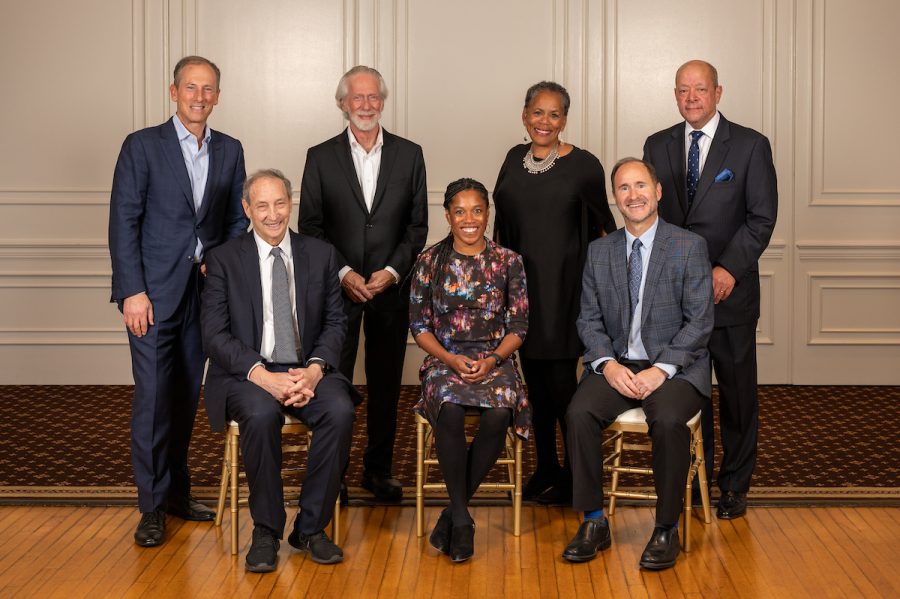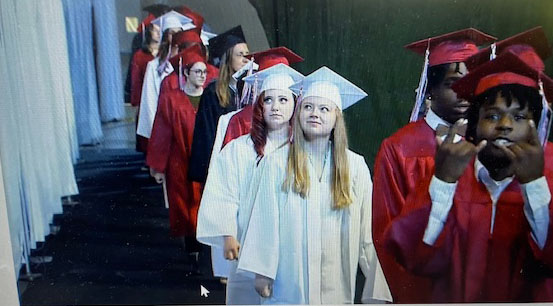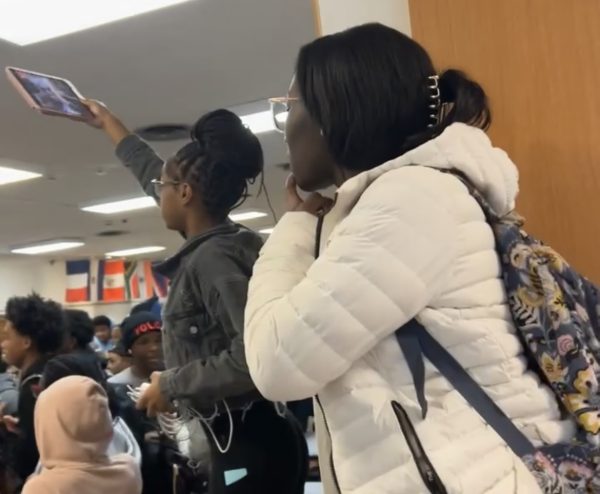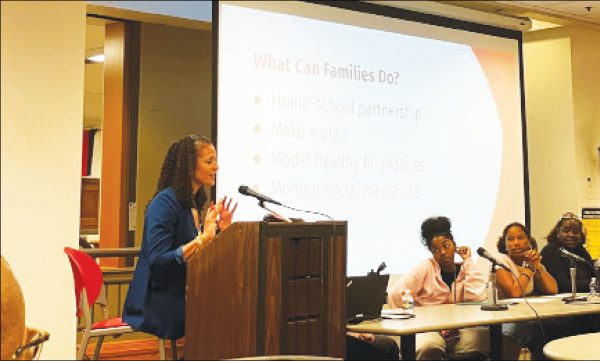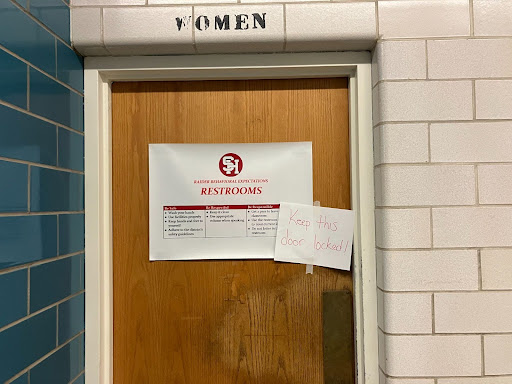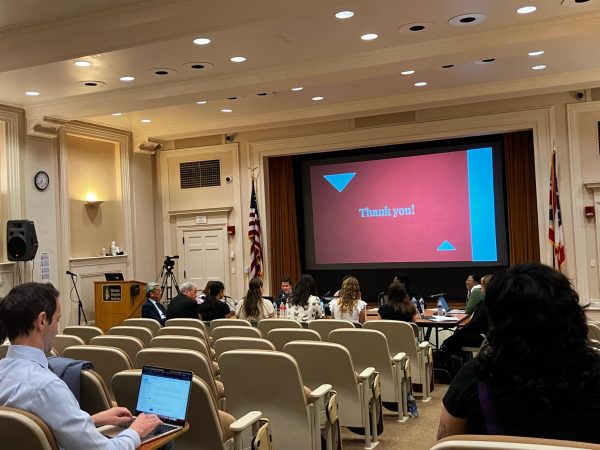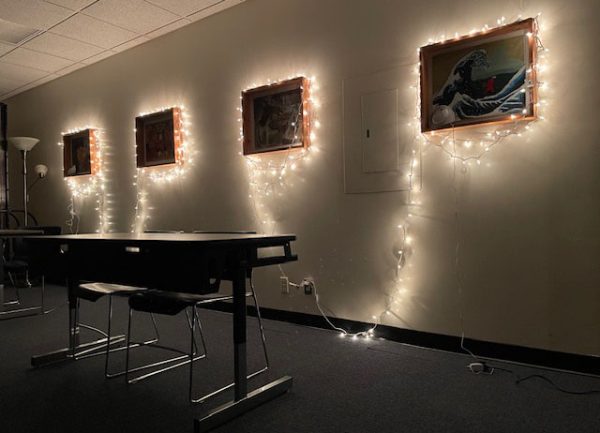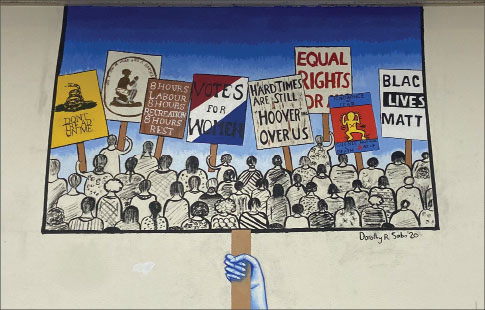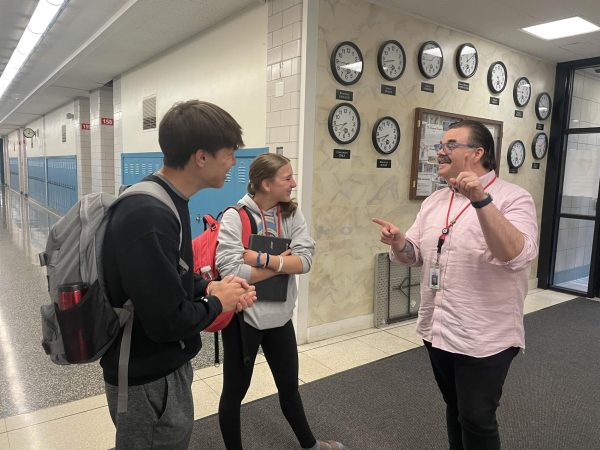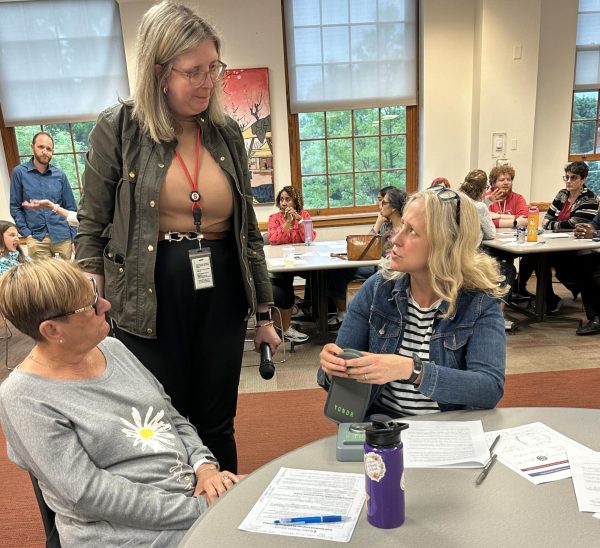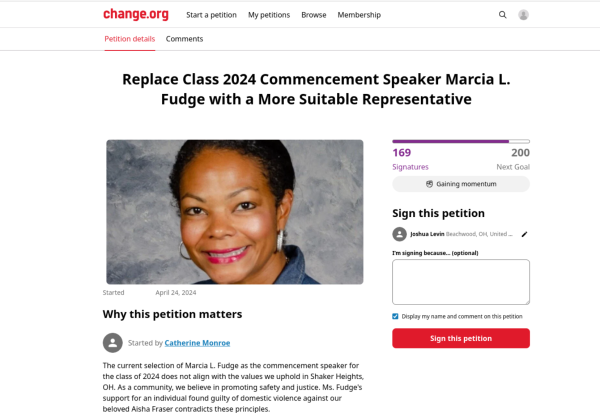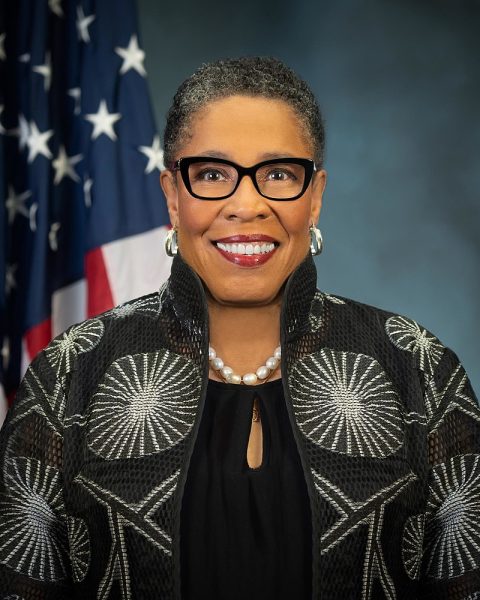7 Distinguished Alumni Join the Hall of Fame
Shaker Schools Foundation Hall of Fame Inductions on Oct. 15, 2022, at Shaker Heights Country Club
The newest inductees to the Shaker Schools Foundation’s Alumni Hall of Fame addressed juniors and seniors during an assembly Oct. 14.
The Hall of Fame comprises Shaker Heights High School alumni who “have made significant contributions to the fields of television, film, journalism, social justice, advocacy, commercial real estate, higher education and diversity, equity and inclusion,” according to the Shaker Schools Foundation. The foundation selected seven inductees for 2022, bringing the total number of members to 321.
Clothilde Ewing, 1996
“Even though it’s been more than 25 years since I’ve lived here, I still consider this home,” Clothilde Ewing (’96) said at the Hall of Fame Inductee assembly Oct. 14.
Ewing’s recent picture book, “Stella Keeps the Sun Up,” was inspired by a need for more “Black joy” in childrens’ books. Her passion for literature began in Shaker, where she felt that diversity was both normalized and celebrated. When she went to Syracuse University after graduating, she realized just how unique that was. “I encountered students who had never been friends before with a Black person,” Ewing said.
Ewing described her experience applying to the Oprah Winfrey Show, where she was a producer for three years. After being rejected, she emailed everyone she knew, searching for a connection to Oprah Winfrey. In the end, she said, it was a lifeguard she had once worked with at Shaker that helped her make that connection and get the job.
“Risk is not one of those four-letter words you need to avoid,” Ewing said. She advised Shaker students to “trust their gut” and approach problems with an attitude of “Why not?” Ewing’s stubbornness was what eventually led to her working on the show.
Ewing applied this advice when writing her picture book. After reading an opinion piece on the lack of books with diverse characters that did not center on oppression or struggle, she realized that she could do something about it. Now, children of all colors dress up as Stella, her book’s main character.
As a high school student, Ewing did not expect to write a picture book, or work as a producer. Said Ewing, “But looking back, I can’t help but think growing up in Shaker and attending this high school had a lot to do with it.”
Isabel Siegel and Heaven Clark
J. David Heller, 1983
“Watching how people have been incredibly successful in their lives and then using that money to change the world – that role model is something that drives me every single day.”
David J. Heller (’83) has led a life of philanthropy and community service in the Greater Cleveland area, as well as Jewish communities local and worldwide. He is now the President, CEO and Co-Founder of NRP Enterprises, an organization committed to developing communities and creating rental opportunities for everyone, regardless of income.
Today, the NRP Group is a widely respected organization, and the recipient of high recognition nationally. This includes being ranked the top multifamily developer in the United States, the 2020 Developer of the Year by Multi-Housing News, and the 2020 Builder of the Year by the National Association of Home Builders Pillars of the Industry Awards. In his speech, Heller admitted that he was not a top student at Shaker. “I was not an A-plus student. I was probably a B or B-minus student.” Addressing current Shaker attendees, Heller said, “So to all those students out there who are not academic powerhouses, I hope to see you up here one day.”
Overall, Heller stressed three points: the importance of reading, a growth mindset, and a mentorship mindset. “If you can change your life to be a growth mindset instead of a fixed mindset, it will change your life forever,” he said.
He noted his troubles with reading. “I was not a voracious reader. I was someone who struggled to read,” he said. Today, Heller reads more than 150 books a year with the help of audiobooks.
“It’s really changed my life,” he said.
Heller made sure to emphasize the importance of the “mentorship mindset.” He spoke of how each person you talk to can offer something to teach you. Said Heller, “It’s a mindset that you can learn [from] every single person you come in contact with.”
Lilah Raddock
Adam Lehman, 1985
“Remember to serve others. Remember to give back.”
Adam Lehman (’85) is the president and CEO of Hillel International, a global campus organization that connects Jewish students with each other, Jewish traditions and locations such as Israel, and serves as a platform for the next generation of Jewish leaders to inspire many more to come.
Prior to becoming the president of Hillel International, Lehman was the chief operating officer of the organization for four years, president and CEO of advertising firm GeniusRocket and held the same job at Lotame Solutions, a company that analyzes software and data. He graduated summa cum laude from Dartmouth College and cum laude from Harvard Law School.
Lehman expressed his thanks to the Shaker schools for being such a diverse environment, saying that he was glad to have been around so many different kinds of people throughout the years. He also said that the current Shaker students are able to share their values that they learned here in the world where not many places have the same opportunities to interact with other cultures as Shaker does.
“We have a challenge in our society right now, where people are not recognizing differences,” Lehman said. “You can all be amazing ambassadors helping to break through that challenge.”
He also gave two more pieces of advice: find out what you’re skilled at and use it to your advantage, and improve on yourself, little by little – it doesn’t have to be overnight. “Two percent a day,” he said. “Get a little better, every day.”
Over his suit and tie, Lehman wore his Shaker Heights letterman jacket, made more than 30 years ago. “I heard it was spirit day, so I broke this out. I haven’t worn this in 32 years,” he said. “Go, Red Raiders!”
Daniel Carroll
Ted Mason, 1968
“If you shift from the great person model of leadership,” said Ted Mason (’68), and “think about what it is that is required of us every day, then we understand the ways in which we, ourselves, are leaders.”
Mason is a professor of English at Kenyon College, a position he has held for 33 years. He has taught as a college professor for about 50 years, and his work focuses on making institutions less prejudiced and more equitable. He spoke about how everyone can be a leader and make change.
Mason said that his time at Shaker Heights High School taught him important lessons. “I am indebted to the education I received here,” Mason said.
While he was at the high school, he witnessed racism and antisemitism. He interacted with people who were different from him, and learned that different kinds of people actually have a lot in common.
He also highlighted the similarities between the present and the 1960s, when the Vietnam War took place. “There are great parallels between when I was a student at Shaker and when you are a student at Shaker,” he said.
Mason said that he was shocked when he left Shaker and found much less integration and inclusivity on the campus at Wesleyan University, which he graduated from in 1972. He later earned a Ph. D. in English from Stanford University.
Before he taught at Kenyon, he taught at University of Virginia, Trinity College and Mount Holyoke College. From 1999 to 1993, he was the John B. McCoy-Bank One Distinguished Teaching Professor, which is a special position for professors at Kenyon College.
Mason said to ask yourself, “What is required by me today? What do I require of myself today?”
Olivia Cavallo and Iris Von Der Heydt
Dale Pollock, 1968
“I’m just kind of the show biz guy who made a few movies.”
Dale Pollock (’68) is a renowned journalist, film producer, author and professor. He earned a bachelor of arts degree in anthropology from Brandeis University and a master of science degree from San Jose State University.
He reflected on his education at Shaker during his speech. “At each juncture of my career, when everything seemed to finally work out and settle down, I reached higher, because that’s what I learned to do at Shaker,” he said. “I went from editing The Shakerite to being a columnist at the L.A. Times.”
Pollock wrote the first biography of Star Wars creator George Lucas, “Skywalking: The Life and Films of George Lucas” (1983). He became the head film critic for Daily Variety in 1977 and was chief entertainment correspondent for The Los Angeles Times.
Throughout his life, he said, he noticed his love for film, which encouraged him to start his own film company, Peak Productions. He produced “Set it Off” (1996). The film, which starred Jada Pinkett Smith, Queen Latifah, Viveca Fox and Kimberly Elise, had a $9 million budget and earned $41.6 million worldwide.
Pollock, who is awaiting publication of his first work of fiction, “Chopped: A Novel,” also taught film at the UNC School of the Arts. He earned the 2016 UNC Board of Governors Award for Teaching Excellence. He said, “I’ve devoted my life to teaching.”
Alyson Garfield
Bruce C. Ratner, 1963
“If you see a staircase, take it and see where it goes.”
Bruce C. Ratner (’63) has been a successful person in many aspects of life since his graduation from Harvard University in 1967 and Columbia Law School in 1970.
“I wanted to do something that could help people, so I decided to work for the city of New York,” Ratner said.
He went on to be a director of the Model Cities program until 1973. Model Cities was a federal program launched in the 1960s and intended to alleviate problems of the inner city. Ratner then led the Consumer Protection Division in the administration of New York City Mayor John Lindsay and taught at NYU’s law school from 1974 to 1978. He then returned to working for the city of New York, this time under Mayor Ed Koch, where he became consumer affairs commissioner.
After working for the city for years, he decided to do something new. “So I took a big chance and decided to work for myself,” he said. In 1985 he co-founded Forest City Ratner, a joint venture with his family’s company, where he is now executive chairman. He has helped develop many buildings and other public areas such as MetroTech, The New York Times Building, New York by Gehry (a 76-floor skyscraper) and most notably, The Barclays Center (home of the NBA’s New York Nets).
Ratner was also a minority owner of the Nets. He purchased the team with an ownership group at a cost of $300 million. He then relocated the team from New Jersey to Brooklyn.
At the end of his speech, Ratner referenced the rising number of book challenges occurring throughout the United States. He said, “We cannot let those banned books try to limit what we teach. I encourage you all to keep Shaker just how it is.”
Nico Caretto, Elinor Reininger and Emma Setser
Beth E. Richie, 1975
“It matters how you live, and your values should show up in your everyday life.”
Dr. Beth E. Richie (’75) has led a life of activism for women’s freedom from violence. She is a professor of criminology, law, justice, sociology, gender and women’s studies, and African American studies at the University of Illinois at Chicago.
She has been given the Advocacy Award from the U.S. Department of Health and Human Services, Audre Lorde Legacy Award from the Union Institute, and the Visionary Award from the Violence Intervention Project.
During her speech, Richie recalled her experiences growing up in Shaker and attending Shaker schools. She touched on how her family was the first Black family in the Mercer area. Although she was always accepted, she said, she was often the only Black child and recalls that she “sometimes felt out of place.”
Richie said that now she understands that her parents chose Shaker “to set us up for a life where we could embrace challenges and live comfortably.”
She stressed the importance of her passions within her career, her interest in understanding other people’s stories, and understanding those that think differently. “I decided to get a Ph. D. in sociology because I wanted to not only feel the excitement of that life, but study the excitement of that life,” said Richie, who decided to teach college courses at a men’s prison because she “wanted to understand those stories, too.”
Richie left the audience with three pieces of advice: Stay connected to where you come from; live according to your values and you’ll live a better life; and always stay humble and remember to take the long view.
Will Stewart and Francesca Iversen

